MercoPress. South Atlantic News Agency
Tag: Kirchnerite corruption
-
Tuesday, June 10th 2025 - 22:52 UTC
CFK faces arrest and political lifelong ban
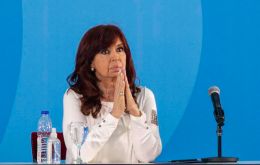
Argentina's Supreme Court (CSJN) unanimously upheld a six-year prison sentence and lifelong disenfranchisement from public office for former President Cristina Fernández de Kirchner (CFK) in the Vialidad case, which involved irregularities in awarding 51 public road works contracts in Santa Cruz to businessman Lázaro Báez.
-
Saturday, March 22nd 2025 - 09:36 UTC
Significantly corrupt CFK banned from entering US

The United States declared former Argentine President Cristina Fernández de Kirchner (CFK, 2007-2015), her children Máximo and Florencia Kirchner, and former Planning Minister Julio de Vido significantly corrupt, banning them from entering the country, among other measures, for their involvement in significant corruption during CFK's back-to-back four-year terms.
-
Saturday, February 22nd 2025 - 10:18 UTC
CFK meets with Pepe Mujica and his wife “in farewell tone”
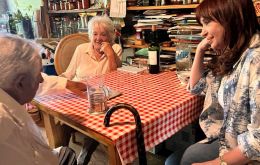
Former Presidents of Argentina Cristina Fernández de Kirchner and Uruguay José Pepe Mujica met Friday at the latter's estate outside Montevideo in an encounter that made headlines for two reasons: First, because of what two progressive leaders getting together represents, with Mujica's wife and former Uruguayan Vice President Lucía Topolansky taking part. It was CFK's first visit to Mujica's farm.
-
Tuesday, September 19th 2023 - 08:19 UTC
Grim future ahead for CFK

Chaco Governor Jorge Milton Capitanich's failure in his reelection bid has triggered a series of setbacks for Argentine Vice President Cristina Fernández de Kirchner, whose aura is beginning to wane, marking the end of Kirchnerism as the main line within Peronism.
-
Saturday, September 24th 2022 - 10:43 UTC
CFK links her corruption trial to the murder attempt against her

Argentine Vice President Cristina Fernández de Kirchner (CFK) Friday told the court judging her for alleged corruption in the awarding of public bids to build roads while she was President (2008-15), that the case under treatment was linked to her assassination attempt earlier this month.
-
Monday, August 1st 2022 - 20:38 UTC
CFK's links with Báez proven beyond doubt, Argentine prosecution claims
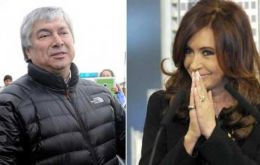
Argentine Prosecutor Diego Luciani Monday claimed there was “enormous relevant evidence” against current Vice President Cristina Fernández de Kirchner and 12 other defendants in a corruption case regarding public works in the province of Santa Cruz between 2003 and 2015.
-
Saturday, November 27th 2021 - 09:55 UTC
CFK acquitted in corruption cases: Operations were legit, judges said

Former Argentine President and current Vice President Cristina Fernández de Kirchner and her children will not be tried in the so-called Hotesur so-scandal case because there were no illegal actions involved, a federal court in Buenos Aires ruled Friday. Hence, all charges have been dismissed.
-
Friday, July 10th 2020 - 09:00 UTC
Massive protests in Argentina demand justice and freedom; president Fernandez pledges to end “the serial haters”
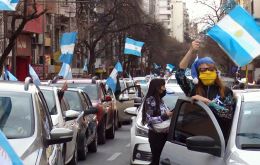
Thousands took out to the streets in Argentina's capital Buenos Aires and the country's main cities with flags on Thursday, July 9th, Independence Day to protest pandemic restrictions for businesses, corruption, and magistrates decision to send under house arrest one of the most notorious characters of the country's corrupt practices in the awarding of public works contracts.
-
Monday, March 23rd 2020 - 07:49 UTC
Cristina Fernandez is back in Buenos Aires from Cuba with her daughter

Argentine vice president Cristina Fernandez is back in Buenos Aires from Cuba with her daughter who has been under medical treatment in Havana for a year. The two immediately left for their home where they will comply with the mandatory fourteen day self isolation for any passengers arriving in Argentina from overseas because of the coronavirus pandemic.
-
Friday, May 17th 2019 - 09:59 UTC
Cristina Fernandez's first corruption trial confirmed for next Tuesday
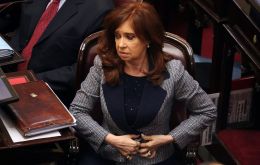
Argentina's Supreme Court ruled on Thursday that ex-president Cristina Fernandez de Kirchner's corruption trial can go ahead; after protesters demonstrated against rumours the case might be delayed. Trial is set to begin on Tuesday over accusations that CFK favoured businessman Lazaro Baez in the attribution of 52 public works contracts worth 46 billion pesos (US$1.2 billion) during her 2007-15 presidency.
